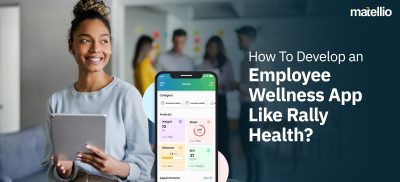
Being a foodie is not rare and who doesn’t crave a slice of pizza while binge-watching Netflix. And what is better than getting your favourite ice cream delivered from your favourite parlour at midnight without you having to move even by an inch? With technological advancements, every industry has stepped into the online world. Undoubtedly, food delivery channels couldn’t be left behind.
By easing the whole procedure of ordering food, not limiting to a single cuisine or some specific restaurant, Food industry has boomed. To eat is a never-ending need of human body and desire to explore varying dishes is going to only to rise in the era of the internet. Hence, investing in this sector doesn’t sound a bad idea! Does it? Before getting software of your own, glance through the already existing applications in the market.
One such popular name in this arena is GrubHub.
What is GrubHub?

GrubHub is an online food delivery application. It provides the customer with their preferred eateries from the comfort of their sofa by nothing but a few taps. It has not only to ease the process of ordering food online but has also helped food stores in broadening their audience. GrubHub enables you to explore local restaurants menu and savour whatever your heart desires while you are deeply engrossed in the mystery of Sherlock Holmes.
Numbers Speak for Themselves
- Revenue in the Online Food Delivery section amounts to US$107,438m in 2019.
- Revenue is expected to produce a yearly growth rate (CAGR 2019-2023) of 9.9%, generating a market volume of US$156,819m by 2023.
- Revenue in the Restaurant-to-Consumer Delivery segment amounts to US$53,652m in 2019.
- Revenue is expected to show an annual growth rate (CAGR 2019-2023) of 8.6%, resulting in a market volume of US$74,643m by 2023.
- User penetration is 8.6% in 2019 and is expected to reach 11.0% by 2023.
- The average revenue per user (ARPU) currently is US$84.98.
- In global comparison, most revenue is generated in the US (US$13,356m in 2019).
Type of Food Delivery Models:
Primarily there are three food delivery models that one can consider before entering this space.
Restaurant Model
Justifying the name, this model works with the food stores that wish to have their application. Starbucks mobile app falls under this category.
The Aggregator
In this model, the entrepreneur launches software that brings customers and restaurants at one platform. As a third party admin, one has to manage both customers and restaurants. An app, under this model, allows the customers to order food online and restaurants to complete orders without any delivery support from the app’s parent company.
Delivery Supporting Model
In this category, the app owner provides logistics support to the restaurants signed up on this system. This is where you monitor the whole system except for food preparation. The end users are going to have the option of selecting food items and make the final order. Both end users are given the facility of tracking the package to have an insight of status.
Features
| Customer panel | Restaurant owner | Delivery Personnel |
| Check Menu | Dashboard | Registration |
| Add to Cart | Post Content | Profile Management |
| Choose the delivery method | Promo Codes | Customer Identification |
| Make payment | Update Menu | Availability Status |
| Order Cancellation | Check Upcoming Orders | Notifications |
| Track the order | Track the Order | Accept or Reject Order |
| Email Notifications | Receive Payments | In-app Navigation |
| Review | Feedback Management | View Earnings |
Big Players
Before trying your hand into any new business, it is of uttermost importance to check the existing competition playing big in the market.

UberEats
UberEats is unique in its’ operation. It facilitates ordering from local food stores and delivers the package with the help of freelancing drivers associated with this brand. Its’ popularity and uniqueness of concept has led many entrepreneurs to question their method of working. The range of cuisines is enormous, and the consumers are certain to find a dish of their own choice instead of settling for something average, owing to its’ huge market share.
Deliveroo
In Deliveroo, consumers can choose the food store of their choice from a comprehensive list of restaurants depending on the locality. Post that they can order their favoured dish and get it delivered at their doorstep. The deliveroo model offers a huge number of benefits to everyone involved, be it the restaurant owner, consumer or the delivery guy. Food lovers get qualitative food from the comfort of their bed, restaurants who aren’t capable of delivering can leverage the delivery system and the delivery guy gets to choose their working hours plus enjoys a good compensation.
Postmates
The core notion behind Postmates is to create demand. Using the desktop or smartphone version of the app, the user can request an article to be delivered. The order is considered to be completed only after the user finished the payment procedure. The delivery fee is added to the bill depending on the distance between the store and the customers’ place. Once the order is confirmed, the nearby delivery personnel receives a notification of the former. The postmate guy then picks up your package and delivers it within an hour. In case of delays, alerts are sent to the receiving party.
DoorDash
DoorDash has emerged as a solution to connect people with the best in their town. Not only has it provided power and ability to the local food providers but has proved to be a good employment generator. It has opened up new ways for people to earn a livelihood.
DoorDash users can select the dish from the list of menus of different restaurants from the app. It possesses various searching and sorting filters giving users a better outlook. The customer then pays for the order which is then forwarded to the respective restaurant. The latter prepares the food and readies it for delivery. Dashers (Delivery guys) get notification regarding the same and have a choice of accepting or rejecting the item.
Also Read: Unlock the potential of pet tracker app development to enhance pet safety, real-time tracking, and owner connectivity.
Tips & Tactics
Here are a few tactics which one should consider before delving into the app development procedure.
Analyse the Market
Prior to building an app like GrubHub, one should analyze the market trends. Check out your competition, see what kind of services they offer. The uniqueness of idea is the ice-breaking factor. Try coming up with something new that gives you a face in the market.
Understand the masses; try looking at things from their perspective. Know what they want; it is no secret that residents of every locality have different food preferences. Giving offers according to their preferences, will give an edge over your competition.
Find partnering restaurants
When you are just beginning, this might come as an obstacle owing to your newness. Huge brands may or may not trust with their order delivery; hence, it is wise to start with small restaurants. They need promotion and instead of running behind the famous brands, focus on increasing the partner count.
Reach the masses
Key to the success of a delivery business is simple: larger the user base, higher will be order placement. The more orders they make higher will be your revenue generation. But how to do that? What is the formula of reaching the masses?
- Just start: Launch your app in a small area and see how users respond. Notice their reactions and make relevant changes accordingly.
- Advertise: Take help of different channels for advertising your app. It may include social media, PR technologies, referral programs and more.
- Collaborate: Small and large retailers have gained some audience already, so don’t hesitate to join hands with them for the growth of your business.
Retain Customers
Attracting customers is one thing and retaining them is another. It won’t make much sense if the users uninstall the app after a single usage. Although there are certain ways in which you can keep your food lovers hooked to the software.
Scroll Down to know more!
- Customer Support
Quick, warm and query solving responses are always welcomed. After all, who doesn’t like a bit of friendly support in the hour of need?
- Special Offers
Launch special discounts, coupons and offers, giving the customers a good reason to stick with your application.
- Rate the Pack
It is a very simple yet effective system that allows app users to rate. It gives you an overview of the whole operation in addition to ensuring qualitative services.
- Retain Couriers
Without delivery personnel, the food ordering software doesn’t hold much value. Thereby jot a strategy for retaining them as they are as important as the consumers. Following are some of the hacks usually practised to keep them interested:
- Good salary
Postmates delivery guys earn around $10-20 per hour.
- Flexible Scheduling
Allow the couriers to choose their working hours for more comfortable work life.
- Encouragements
The best couriers should be rewarded from time to time, encouraging others to follow their pathway.
How to make money from a Food Delivery app?
Now since we have looked into the online food delivery app from a holistic level, it is time to skim through the numerous methods of making money in this business.
Delivery Fees
There are a number of eating houses who can’t provide the facility of home delivery. In such cases pushing delivery personnel will fetch you the money. The model in which you decide to take the responsibility of handling delivery services is what earned Deliveroo a profit of $164 Million in 2017. Swiggy charges a delivery fee of 30-35% of the order price.
Raise the Price
When the demand gets too high, brands like UberEats raise the prices. They eliminate menu options and charge an additional amount at the time of order placement. Though, this reduces the rate of incoming demand but the delivery cost per order increases to a considerable extent.
Charge Commission
Taking commission from the partnered eateries for every order is definite and the most time-tested methods of generating revenue for on-demand food delivery apps. Additional to producing high revenues, it also helps in forging a long-lasting partnership between both the parties.
Advertise
Again a sure shot method of generating revenue is Advertising. By allocating restaurants, a place in the featured section or by running a video promoting their brand in the app home screen is a decent mode of revenue production. Also, by running Google Adsense on their platform, apps can earn to a greater extent.
Future of online Food-delivery Apps
Everything is transient, and so does the technological world. With emerging trends, apps get outdated if they don’t update in this ever-evolving era. Therefore, to make your app stand the test of time, we have listed some of the points that our dear reader should concentrate before coming into the pit.
Keep Reading!
New channels for Food Ordering
In addition to the usual food ordering channels like mobile apps or websites, foodies will have new platforms for placing orders such as Social Media, Virtual Assistants. It will also include smart objects like TV, Wearables, Car Dashboards and more.
Delivery Options
Apart from having new options, the users will also get to see some new modes of getting their dishes delivered at their doorstep. These options will include drones, parachutes, robots for making the delivery. Hence, your application should be in shape so that it can be integrated into such modes.
Explore other sections
New models will be introduced exploring less-known sections such as,
- Pet food module
- Recycle the food
- Health condition section
So try including these kinds of areas, to make your app future-ready.
Artificial Intelligence
Time is to make a simple service app smarter. With the AR/VR integration, apps will be based on user engagement. They will keep the consumer hooked on screen, even when their dish is taking time to get delivered. Also, it will assist in improving the marketing of software by analyzing food choices.
Big Data
Big Data in the food business is considered to be a niche category in current times, but the future will be different. The future will see a lot of difference with its’ right involvement. Big data is going to reap a number of benefits like a better understanding of consumer sentiments, improvised delivery time estimates, personalized marketing and eventually better demand predictions.
Conclusion
With this, we have come to the end of this insightful journey of food delivery app development. Having gathered the required information, it’s time to get into the action mode. Contact Matellio and leverage our two-plus decade expertise in software development. Or maybe you need a bit more information; in any case, our team is happy to help!
Disclaimer: Please note that the content of this blog including links, texts, images, and graphics is only meant for informational purposes. We do not intend to infringe any copyright policy or do not possess any third-party material. If you have issues related to any of our content or images, kindly drop your message at info@matellio.com


